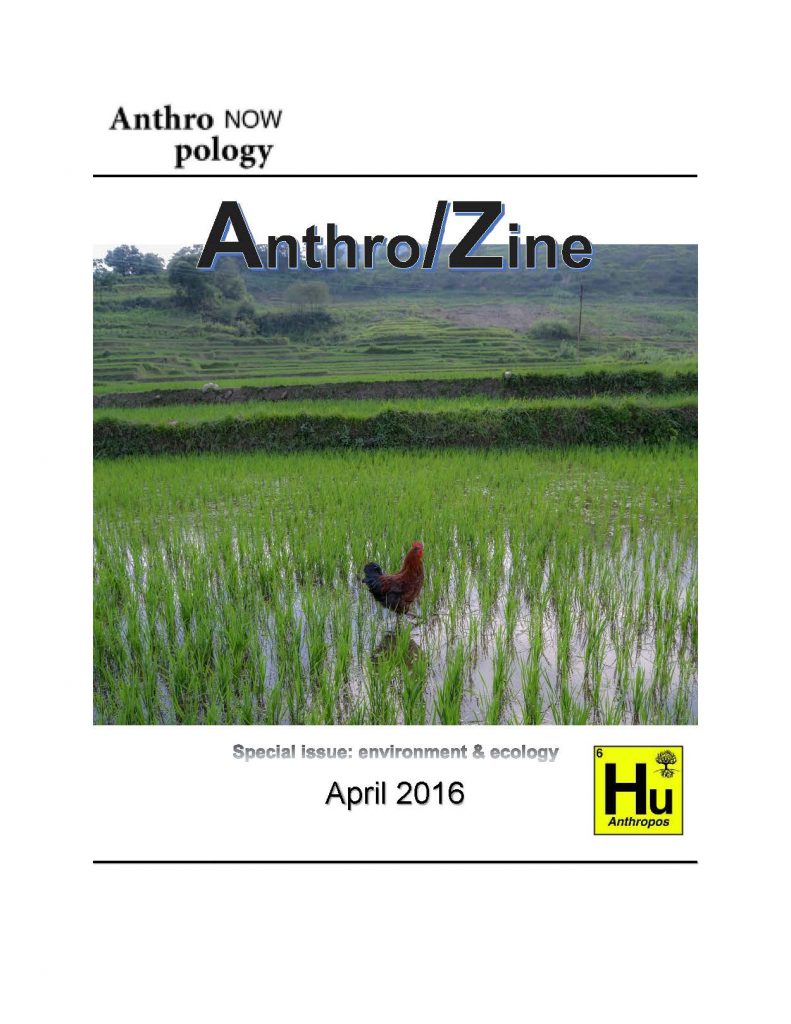Anthro/Zine, a venue for undergraduate publication from the team behind Anthropology Now, has entered its second year of publication. The premise behind the project is to provide a space for college students to reflect on how anthropology, in all its myriad forms, has touched their lives. As editor I have been completely blown away by the quality and creativity of our submissions which have included not only essay, but also art, poetry, photography, fiction, and what I call “briefs” — very short pieces. There are now four issues, open access and CC-BY, available at the link above. Check out our latest issue below!
Anthro/Zine publishes April, September, and December coinciding with each new issue of Anthropology Now. If you are a student or recent college graduate and would like to make a submission of some sort that is relevant to anthropology then we would like very much to see what you have to offer. We are most interested in seeing work that is creative, personal, and short. Original research is welcome but we do not publish term papers. Do not submit to us what you have given your professor, your peers are your audience here. Reflect on what you have already accomplished and tell us about your experience of encountering anthropology.
A/Z is not a venue for graduate students, however it is appropriate for grads to submit their work directly to Anthropology Now, please see their guidelines here.
Students or faculty with questions can reach me at mthompson@marinersmuseum.org, if you would like your work considered for the September issue than make your submission by August 1.
Click on the cover or the hyperlink below to download a pdf of our latest issue:
~~~~~~~~~~~~~~~~~~~~~~~~~~~~~~~~~~~~~~~~~~~~~~~~~~~~~~~~~~~~~
~~~~~~~~~~~~~~~~~~~~~~~~~~~~~~~~~~~~~~~~~~~~~~~~~~~~~~~~~~~~~
In our most recent issue, Emily Crawford, a student of Environmental Humanities at the University of New South Wales, contributed this wonderfully written piece with original photography about her fieldwork in Bali. She was generous enough to offer additional reflections about the writing process and seeing her work through to publication with Anthro/Zine.
I’ll take my leave here, and, take it away Emily!
The Antho/Zine Experience
By Emily Crawford
Ethnographic fieldwork is what keeps me interested in Anthropology and Environmental Humanities where I am completing my Honours. This is the ‘gonzo’ (‘participant observation’ if you must) fieldwork where you get to “deep hangout” (See Clifford Geertz) with informants and collaborators, and get yourself deeply embedded in what you are writing about. At this stage it is careful, but playful. Anything could happen.
It seems to be about allowing yourself to be affected by and interwoven into situations, without bringing heavy theory in at this stage. Doing this consciously allows you to be present and begin to notice things, connections, moments of poetry. For example, I wanted to set this challenge for myself, to write for Anthro/Zine after summer as a way to get back into the rhythm of writing and writing about plants (the subject of my thesis).
The aim was simply to follow the plants and their people around in Bali and write as thickly and colourfully as I could. This meant really paying attention to what Anna Tsing describes as looking around rather than ahead. Igniting the senses, asking (sometimes strange) questions, crouching down, peering closer, taking a photo from a weird angle, turning up again, following subtle leads. Listening.
I find using narrative modes of writing helps to open up and tease out stories. Where critical theory definitely adds depth and richness to ethnography and anthropology, and is necessary in academic writing, this opportunity allowed me to write a story that was personal and connected, observational and perhaps more easily accessible to readers.
Following this fieldwork, my notebook (always essential!) was covered in rambling observations, sketches, and rubbings of various plant materials. Under advice from my teachers, I try to get to the computer quickly to begin typing it up and seeing what deeper narratives emerge from fieldwork, perhaps the antidote to overthinking or writers block. (Easier said than done, but the rhythm of tapping keys seems to help)
I wrote from outdoor balmy cafes and unfamiliar environments, beneath giant tropical leaves, overlooked by curious geckos. Allowing a story to come through is a delicate, sometime uncomfortable art. In fact, there is a lot of contention about how to “do” ethnography correctly (see http://culanth.org/fieldsights/871-ethnography-provocation), and these trepidations are worth paying attention to. We might be careful and remain vulnerable and open to what we are writing about. We might share it around and invite collaboration and creative responses.
This is where Anthro/Zine provides such a wonderful platform to explore ideas and experiences in a more playful and experimental manner. To write freely without overhanging marking criteria’s is a liberating thing. It may as it did for me, help to recalibrate flow in writing, freshening up the senses for the next story to emerge.
 Anthro/Zine | April 2016
Anthro/Zine | April 2016